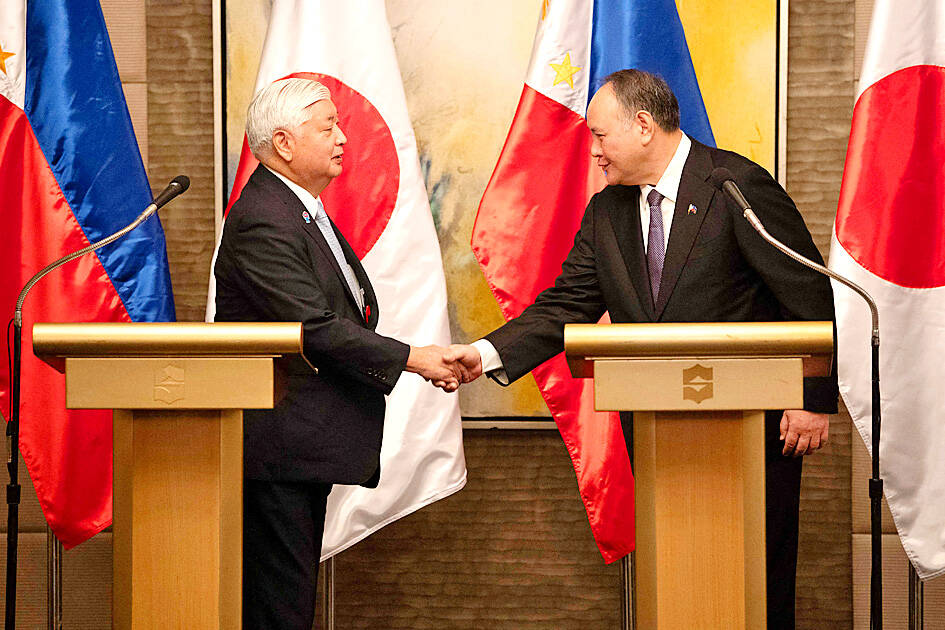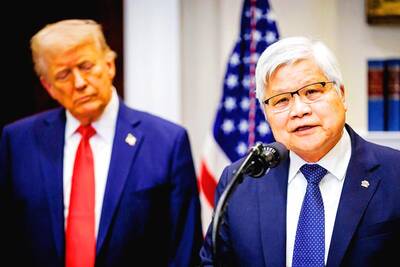An “increasingly severe” security environment has made deepening security ties with the Philippines a necessity, the Japanese defense minister said yesterday after a meeting with his counterpart in Manila.
Speaking as he concluded a two-day visit that included a tour of Philippine air bases, Japanese Minister of Defense Gen Nakatani said the two nations hoped to achieve greater operational collaboration.
“[Philippine] Secretary [of National Defense Gilberto] Teodoro Jr and I firmly concurred that the security environment surrounding us is becoming increasingly severe and it is ... necessary to further enhance defense cooperation,” Nakatani said.

Photo: AFP
He said that the nations had agreed to establish “strategic dialogue between high-level operational officers.”
Nakatani’s visit comes on the heels of a foreign ministers’ meeting last month where the Philippines and Japan vowed to strengthen security cooperation to counter China’s actions in key sea trade routes, including the disputed South China Sea.
Teodoro told yesterday’s joint news conference that the two nations shared the “common cause of resisting any unilateral attempt to reshape ... international law by force.”
China has deployed navy and coast guard vessels in a bid to bar the Philippines from strategically important reefs and islands in the South China Sea, leading to a string of confrontations.
The Philippines in December last year said that a China Coast Guard vessel used water cannon and “sideswiped” a government fisheries department vessel, and last week the Philippine Coast Guard said a Chinese navy helicopter came “within 10 feet” (3m) of a surveillance plane carrying journalists over the contested Scarborough Shoal (Huangyan Island, 黃岩島).
Japan is a key financier of Philippine efforts to modernize its South China Sea patrol craft, as well as maritime surveillance systems including radar installations.
Beijing claims the strategic waterway in almost its entirety despite an international tribunal ruling that its claim lacked any legal basis.
Both Tokyo and Manila are allies of the US, which has been strengthening an arc of alliances to deter China’s claims in the Pacific Ocean.
The Philippine Senate late last year ratified a key pact with Japan that would allow them to deploy troops on each other’s soil. The agreement, which now awaits ratification in Tokyo, also allows for increased joint combat drills.

ENDEAVOR MANTA: The ship is programmed to automatically return to its designated home port and would self-destruct if seized by another party The Endeavor Manta, Taiwan’s first military-specification uncrewed surface vehicle (USV) tailor-made to operate in the Taiwan Strait in a bid to bolster the nation’s asymmetric combat capabilities made its first appearance at Kaohsiung’s Singda Harbor yesterday. Taking inspiration from Ukraine’s navy, which is using USVs to force Russia’s Black Sea fleet to take shelter within its own ports, CSBC Taiwan (台灣國際造船) established a research and development unit on USVs last year, CSBC chairman Huang Cheng-hung (黃正弘) said. With the exception of the satellite guidance system and the outboard motors — which were purchased from foreign companies that were not affiliated with Chinese-funded

PERMIT REVOKED: The influencer at a news conference said the National Immigration Agency was infringing on human rights and persecuting Chinese spouses Chinese influencer “Yaya in Taiwan” (亞亞在台灣) yesterday evening voluntarily left Taiwan, despite saying yesterday morning that she had “no intention” of leaving after her residence permit was revoked over her comments on Taiwan being “unified” with China by military force. The Ministry of the Interior yesterday had said that it could forcibly deport the influencer at midnight, but was considering taking a more flexible approach and beginning procedures this morning. The influencer, whose given name is Liu Zhenya (劉振亞), departed on a 8:45pm flight from Taipei International Airport (Songshan airport) to Fuzhou, China. Liu held a news conference at the airport at 7pm,

KAOHSIUNG CEREMONY: The contract chipmaker is planning to build 5 fabs in the southern city to gradually expand its 2-nanometer chip capacity Taiwan Semiconductor Manufacturing Co (TSMC, 台積電), the world’s biggest contract chipmaker, yesterday confirmed that it plans to hold a ceremony on March 31 to unveil a capacity expansion plan for its most advanced 2-nanometer chips in Kaohsiung, demonstrating its commitment to further investment at home. The ceremony is to be hosted by TSMC cochief operating officer Y.P. Chyn (秦永沛). It did not disclose whether Premier Cho Jung-tai (卓榮泰) and high-ranking government officials would attend the ceremony. More details are to be released next week, it said. The chipmaker’s latest move came after its announcement earlier this month of an additional US$100 billion

Authorities yesterday elaborated on the rules governing Employment Gold Cards after a US cardholder was barred from entering Taiwan for six years after working without a permit during a 2023 visit. American YouTuber LeLe Farley was barred after already being approved for an Employment Gold Card, he said in a video published on his channel on Saturday. Farley, who has more than 420,000 subscribers on his YouTube channel, was approved for his Gold Card last month, but was told at a check-in counter at the Los Angeles International Airport that he could not enter Taiwan. That was because he previously participated in two